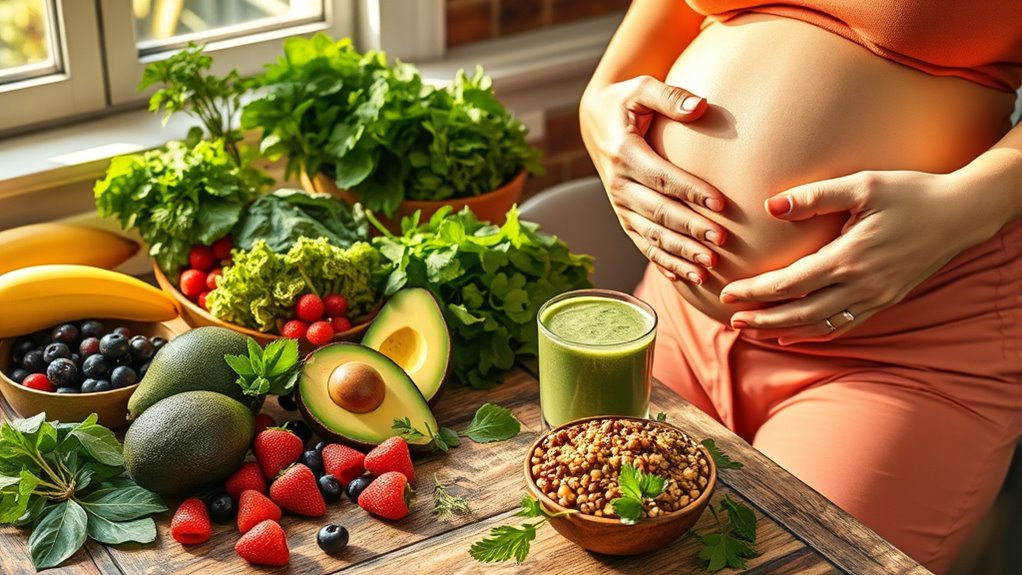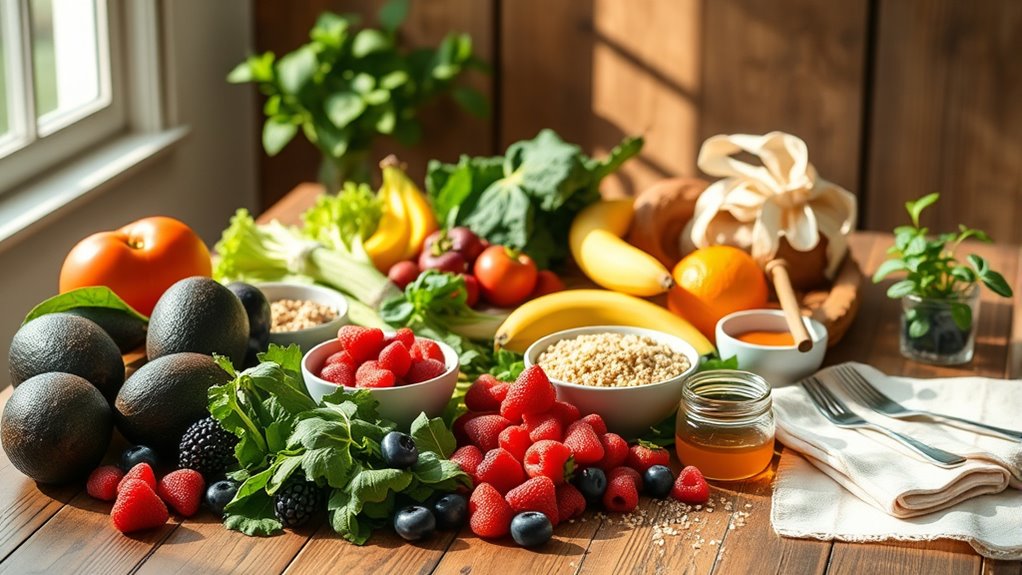A balanced pregnancy diet is vital for you and your baby’s health. Focus on nutrient-dense foods like fruits, vegetables, whole grains, and lean proteins. Keep processed foods and added sugars to a minimum. Don’t forget key nutrients like folic acid, protein, iron, and omega-3 fatty acids. Managing cravings is easier with healthy snacks and hydration. Wondering how to integrate these secrets into your daily meals? Stick around to uncover more tips for a healthy pregnancy!
Key Takeaways
- Prioritize a Mediterranean-style diet rich in fruits, vegetables, whole grains, and lean proteins to support fetal growth and reduce complication risks.
- Ensure adequate intake of key nutrients, such as folic acid, protein, iron, calcium, omega-3 fatty acids, and vitamin D for optimal health.
- Stay hydrated and plan healthy snacks to manage cravings without completely eliminating unhealthy options.
- Limit processed foods, high-mercury fish, caffeine, and alcohol to protect fetal development and maternal health.
- Seek guidance from healthcare providers or support groups for motivation and personalized dietary advice during pregnancy.

What secrets can transform your pregnancy diet into a powerhouse of nutrition? A balanced diet is essential during this special time, supporting both fetal growth and your own health. Prioritizing nutrient-dense foods like fruits, vegetables, whole grains, and lean proteins can make a significant difference. Avoiding processed foods and excessive sugar is crucial, as these can lead to complications like gestational diabetes and preeclampsia. Interestingly, following a Mediterranean-style diet may reduce the risk of preeclampsia by up to 28%, so consider incorporating elements of this diet into your meals. Additionally, research suggests that women consuming the most Mediterranean foods had a 28% lower risk of developing this condition.
Key nutrients play a vital role in your pregnancy. Folic acid is a must for preventing neural tube defects, while protein intake should hover around 70-100 grams daily to support growth. Don’t overlook iron and calcium, as they’re essential for both you and your baby’s health. Omega-3 fatty acids can aid in fetal brain development, and vitamin D is important for bone health and immune function. Including these nutrients in your meals can help ensure a healthy pregnancy. Incorporating baked kale into your diet can also provide a boost of essential vitamins and antioxidants.
Key nutrients like folic acid, protein, iron, and omega-3s are essential for a healthy pregnancy and fetal development.
When it comes to the foods you should prioritize, think whole grains for fiber and essential nutrients, along with an abundance of fruits and vegetables packed with vitamins, minerals, and antioxidants. Lean proteins, such as fish and poultry, support growth, while nuts and seeds bring healthy fats and fiber to your diet. Legumes are another great option, offering protein, fiber, and essential minerals.
On the flip side, there are foods you need to limit or avoid completely. Unpasteurized dairy can harbor harmful bacteria, and raw or undercooked meat and eggs pose infection risks. High-mercury fish should be limited to avoid toxicity, and both caffeine and alcohol can negatively impact fetal development. Processed foods, laden with unhealthy fats and sugars, should also be off your list.
Managing cravings is part of the game, and limiting unhealthy foods rather than cutting them out entirely can be beneficial. Planning ahead with healthy snacks can help you resist temptation, and hydrating can sometimes alleviate cravings. Seek support from healthcare providers or support groups if you need extra motivation.
In the end, adequate nutrition can significantly impact pregnancy outcomes. A balanced diet boosts healthy fetal development, reduces the risk of low birth weight and preterm birth, and even enhances breastfeeding benefits. As you navigate this journey, remember the long-term health benefits for both you and your child are closely tied to your prenatal nutrition.
Frequently Asked Questions
What Are Safe Weight Gain Goals During Pregnancy?
When considering safe weight gain goals during pregnancy, you should aim for specific ranges based on your pre-pregnancy BMI.
For instance, if you’re underweight, you might need to gain 28-40 pounds, while normal weight individuals should target 25-35 pounds.
Overweight women should aim for 15-25 pounds, and those who are obese should try for 11-20 pounds.
Regular monitoring of your weight helps ensure you’re staying within these recommended limits for a healthy pregnancy.
Can I Continue My Regular Workout Routine While Pregnant?
Yes, you can often continue your regular workout routine while pregnant, but it’s essential to make some adjustments.
Keep your intensity moderate, allowing you to talk but not sing during exercise. Always consult your healthcare provider before starting or modifying your routine.
Prioritize low-impact activities like walking or swimming, and listen to your body. If you feel any discomfort, stop and reassess your routine to ensure your safety and comfort.
What Supplements Should I Take During Pregnancy?
During pregnancy, you should take prenatal vitamins that include essential nutrients like folic acid, iron, calcium, and vitamin D.
Folic acid helps prevent neural tube defects, while iron supports red blood cell production. Aim for about 600 mcg of folic acid and 27 mg of iron daily.
It’s also vital to consult your healthcare provider to determine the best supplements for your needs and to avoid excessive intake.
Always prioritize a balanced diet alongside supplementation.
How Can I Manage Food Cravings Healthily?
To manage food cravings healthily, focus on maintaining a balanced diet rich in fruits, vegetables, lean proteins, and whole grains.
Stay hydrated; drinking water can help curb hunger.
Prepare healthy snacks like carrot sticks or nuts to satisfy cravings without guilt.
Meal planning ensures you stick to a consistent eating schedule, reducing impulsive choices.
Lastly, don’t forget to engage in regular physical activity and find distractions when cravings hit.
Is It Safe to Consume Caffeine While Pregnant?
Is it safe to consume caffeine while pregnant? You should limit your caffeine intake to about 200 mg per day.
High consumption can pose risks like miscarriage and low birth weight. It’s important to remember that caffeine crosses the placenta and can affect your baby’s development.
Consider alternatives like herbal teas or decaf coffee. Always consult your healthcare provider for personalized advice regarding your caffeine consumption during pregnancy.
Conclusion
Incorporating these pregnancy diet secrets can truly make a difference. Did you know that a well-balanced diet can reduce the risk of complications by up to 50%? Just imagine how empowering it feels to nourish both you and your baby with the right foods. By embracing these healthy habits, you’re not just fueling your body; you’re also laying the foundation for your little one’s future health. So, get excited and start making those delicious, nutritious choices today!









